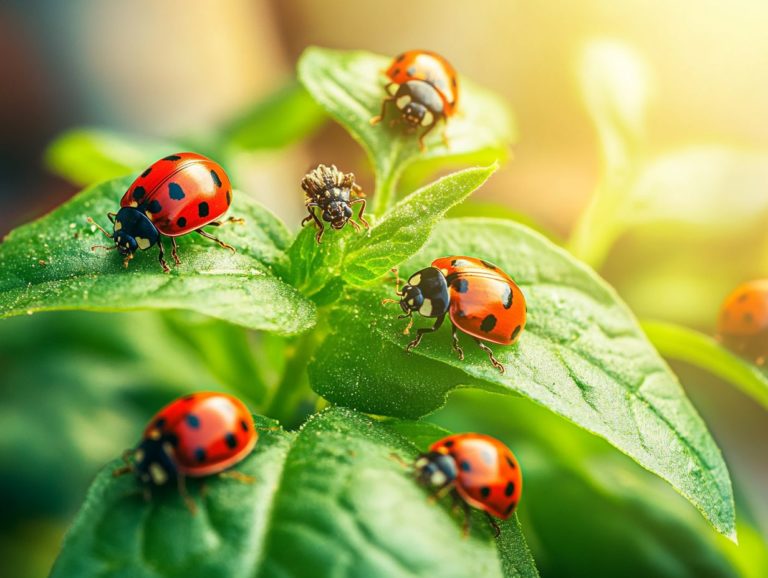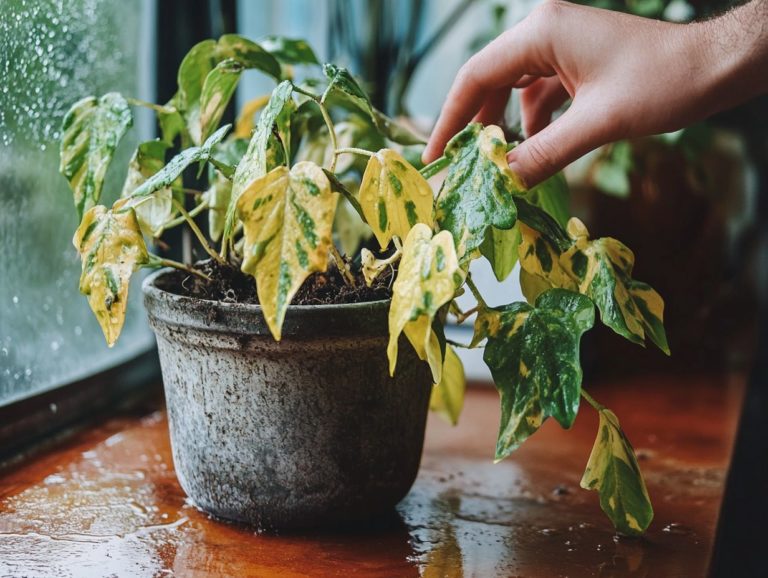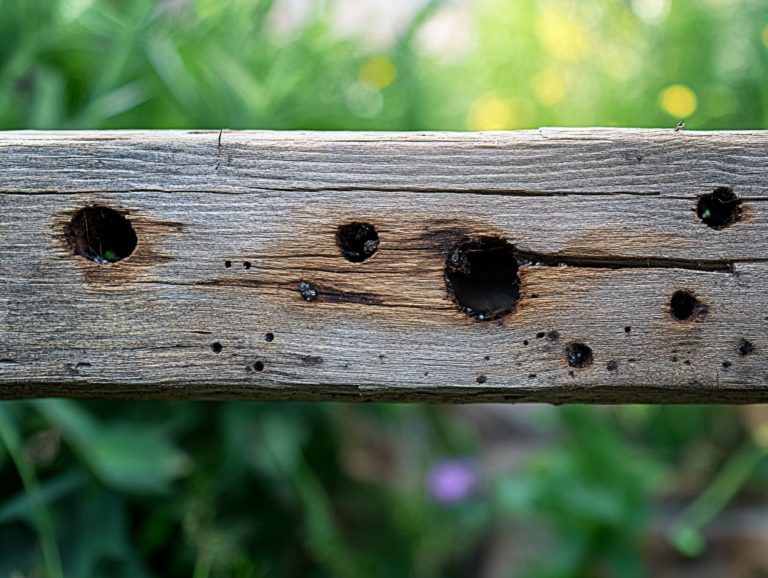Understanding the Role of Nutrients in Pest Prevention
Pest infestations can cause significant disruption to your gardens and crops, but the health of your soil is paramount in keeping these unwelcome visitors at bay.
This article delves into how nutrients and pests affect each other, shedding light on how deficiencies and imbalances can unknowingly attract pests.
We will explore essential nutrients that act as deterrents to infestations, alongside organic methods that enhance your soil’s vitality. By combining effective nutrient management with pest prevention strategies, you can cultivate a flourishing, pest-resistant garden.
Get ready to uncover amazing tips for a healthier, thriving garden.
Contents
- Key Takeaways:
- The Relationship Between Nutrients and Pest Infestation
- Essential Nutrients for Pest Prevention
- Organic Pest Prevention Methods
- Using Fertilizers for Pest Prevention
- Integrating Nutrient Management and Pest Control
- Frequently Asked Questions
- What is the role of nutrients in pest prevention?
- Which nutrients are important for pest prevention?
- How do nutrients affect pest populations?
- Can using too much fertilizer attract pests and affect soil health?
- Are there specific types of nutrients that are better for pest prevention and crop resilience?
- Is there a connection between nutrient deficiencies and pest infestations?
Key Takeaways:

- Nutrient deficiencies and imbalances can attract pests, making it important to maintain a balanced nutrient level in soil.
- Essential nutrients such as nitrogen, potassium, and phosphorus play key roles in pest prevention by promoting plant health and defense.
- Natural methods such as composting and crop rotation can help boost nutrient levels in soil, reducing the need for chemical fertilizers and ultimately preventing pest infestations.
The Relationship Between Nutrients and Pest Infestation
Understanding how nutrients and pests affect each other is crucial for anyone dedicated to sustainable agriculture practices. When crops experience nutrient deficiencies, their susceptibility to pests increases, which can profoundly affect both agricultural production and environmental quality.
To manage pests effectively, you need to manage nutrients well. By balancing primary and secondary nutrients, you can ensure optimal plant health, enhancing resilience against harmful organisms and safeguarding your crop yield.
How Nutrient Deficiencies and Imbalances Attract Pests
Nutrient deficiencies and imbalances in your plants can set the stage for pest invasions, making effective pest management techniques essential for sustaining their health and productivity.
Take nitrogen, for example: without enough of it, your plants may suffer from stunted growth and yellowing leaves, inadvertently rolling out the red carpet for aphids and other sap-sucking insects that love to feast on weakened greenery.
Similarly, when potassium levels are low, your plants can struggle with disease resistance, leaving them more vulnerable to pests like spider mites.
The fluctuations in nutrient levels not only impact the health of the plant but also diminish its defenses against potential threats.
This highlights the importance of adopting integrated management strategies that tackle both nutrient management and pest control, ensuring a comprehensive approach to protecting your crops.
Essential Nutrients for Pest Prevention
Essential nutrients are crucial in pest prevention, as they not only nourish your crops but also boost disease resistance and overall agricultural productivity.
By optimizing these nutrients, you can diminish your reliance on chemical pesticides. Grasping the nutrient requirements of your plants is fundamental to developing effective pest control strategies that strengthen their defense mechanisms.
Key Nutrients and Their Role in Pest Control

Key nutrients such as nitrogen, potassium, and micronutrients are essential players in pest control, enhancing plant health and activating their natural defense mechanisms.
When you ensure these critical elements are adequately supplied, you not only promote vigorous growth but also strengthen the plant’s inherent ability to ward off pests. Nitrogen, for example, is fundamental in synthesizing proteins that contribute to the development of sturdy plant tissues, making them less appealing to insects.
Potassium, on the other hand, boosts overall health by regulating physiological processes like water uptake, leading to greater resilience against pathogens.
Don t underestimate the power of micronutrients, either; although they re needed in smaller amounts, they are crucial for activating enzymes associated with disease resistance, giving your plants the power to flourish even in challenging conditions.
Organic Pest Prevention Methods
Organic pest prevention methods harness natural resources and practices that maintain nutrient content in the soil. This promotes plant health while minimizing the environmental footprint of your agricultural endeavors.
By nurturing beneficial microorganisms and implementing holistic pest management techniques, you can grow strong crops that thrive and sustainably address pest infestations.
Natural Ways to Boost Nutrient Content in Soil
Natural ways to elevate nutrient content in your soil include practices such as composting, cover cropping, and using organic fertilizers. These methods enhance soil composition and support sustainable agriculture while keeping your conscience clear.
By employing these techniques, you enrich the soil with essential nutrients and improve its structure and water retention capabilities. For example, composting provides a rich source of organic matter that encourages beneficial microbial activity. Cover cropping acts as a protective barrier against soil erosion and boosts soil fertility through a process where plants naturally gather nitrogen from the air.
Integrating these strategies allows you to cultivate healthier plants that resist pests and diseases. This significantly reduces your reliance on chemical pesticides. Ultimately, these practices ensure your garden thrives for years to come.
Using Fertilizers for Pest Prevention
Effectively utilizing fertilizers for pest prevention requires a thoughtful approach to nutrient management. This strategy not only promotes optimal crop growth but also reduces reliance on chemical pesticides.
By adhering to customized nutrient recommendations, you can enhance plant health and tackle pest-related challenges effectively.
Types of Fertilizers and Their Effectiveness

The effectiveness of various fertilizers, whether chemical or organic, can profoundly impact nutrient availability and overall plant health, which in turn influences your pest management outcomes.
Chemical fertilizers, often packed with specific nutrients, can deliver rapid results, boosting plant growth in the short term. However, relying too heavily on them can lead to soil degradation and disrupt beneficial microbial populations.
In contrast, organic fertilizers, sourced from natural materials, enhance soil structure and promote sustainable nutrient cycling while minimizing the risk of chemical runoff. This approach fosters a more balanced ecosystem, making your plants less susceptible to pests.
Understanding these dynamics is essential. Choosing the right type of fertilizer shapes the effectiveness of your pest prevention strategies and cultivates a healthier garden environment while minimizing the environmental impact.
Integrating Nutrient Management and Pest Control
Integrating nutrient management with pest control strategies is vital for achieving sustainable agricultural success. By enhancing plant health, you bolster crop resilience against pests and diseases while creating a more harmonious ecosystem.
This holistic approach ensures that nutrients work effectively to support plant defense mechanisms while minimizing the impact of pest infestations.
Strategies for Combining Nutrient Management and Pest Prevention
Combining nutrient management with pest prevention uses methods that improve crop health. This approach effectively reduces pest risks.
Common practices include crop rotation to disrupt pest life cycles and applying organic amendments to enrich soil without harmful chemicals. Implementing cover crops also enhances soil structure and limits weeds, creating an environment less appealing to pests.
Using these methods optimizes growth conditions. It also supports beneficial organisms that naturally control pests.
These strategies promote sustainable agriculture and foster a healthier ecosystem. They help secure food production and protect biodiversity for the future!
Frequently Asked Questions
What is the role of nutrients in pest prevention?

Nutrients keep plants healthy and resilient. Healthy plants are less susceptible to pest attacks.
Which nutrients are important for pest prevention?
Key nutrients include nitrogen, potassium, and phosphorus. These nutrients help plants grow strong and develop natural defenses against pests.
How do nutrients affect pest populations?
Weak, nutrient-deficient plants are more vulnerable to pests. This can lead to increased pest populations.
Can using too much fertilizer attract pests and affect soil health?
Yes, over-fertilizing can create nutrient imbalances that attract pests. It’s crucial to use fertilizers wisely.
Are there specific types of nutrients that are better for pest prevention and crop resilience?
A balanced combination of essential nutrients is vital for effective pest prevention. Each nutrient plays a unique role in plant health.
Is there a connection between nutrient deficiencies and pest infestations?
Nutrient deficiencies can stunt plant growth, making them more susceptible to pests. Regular soil testing helps identify these deficiencies.






